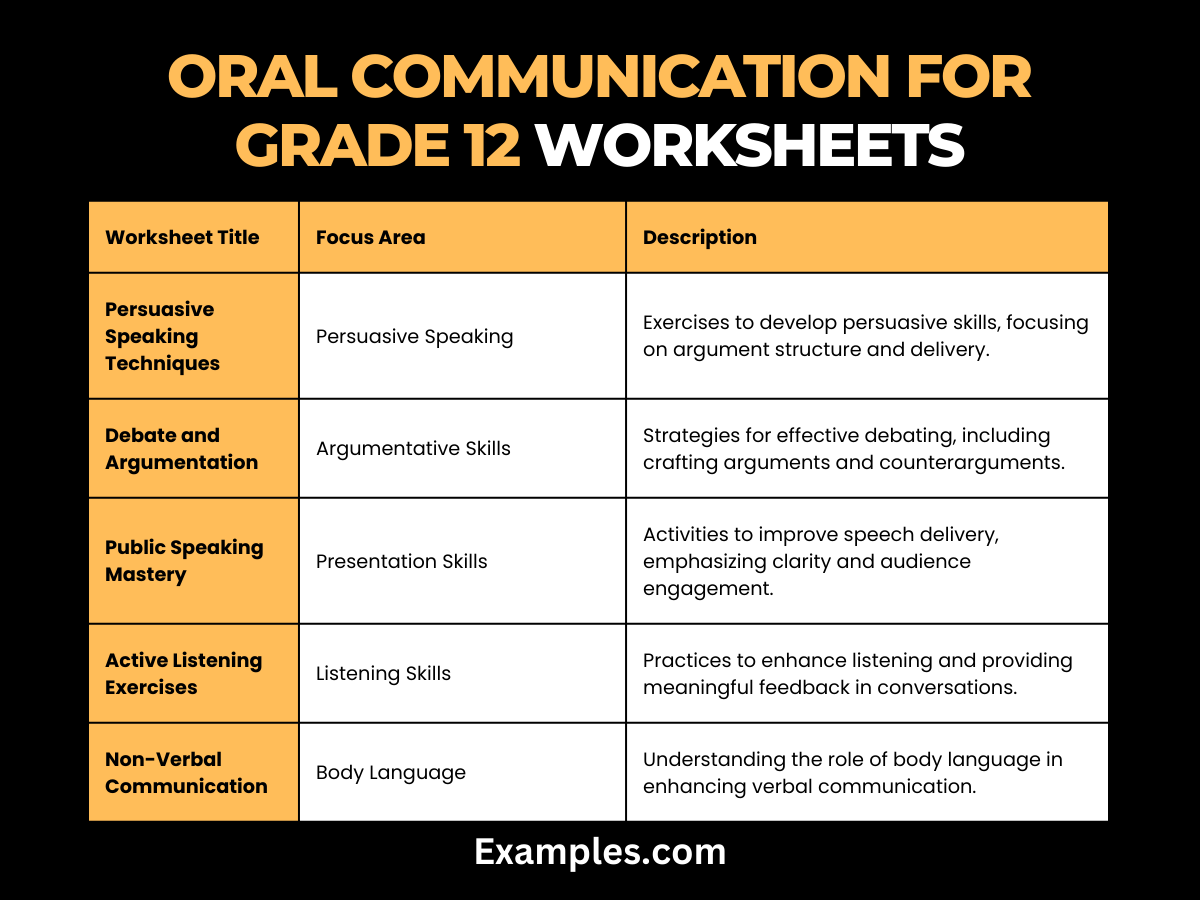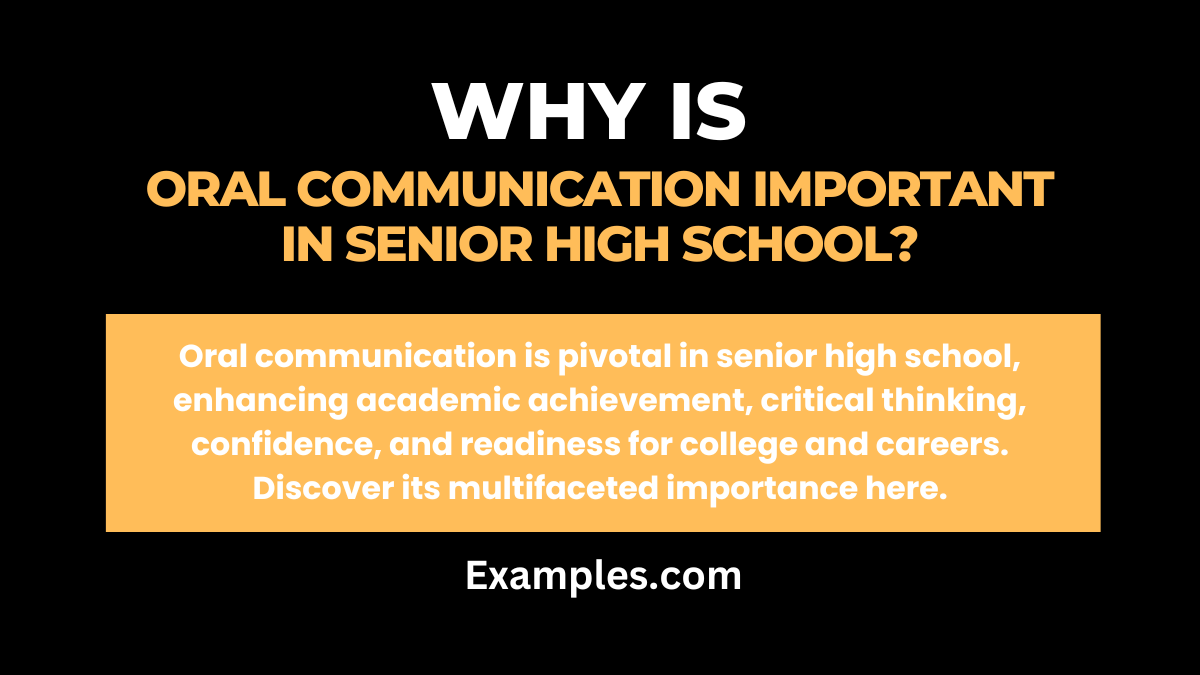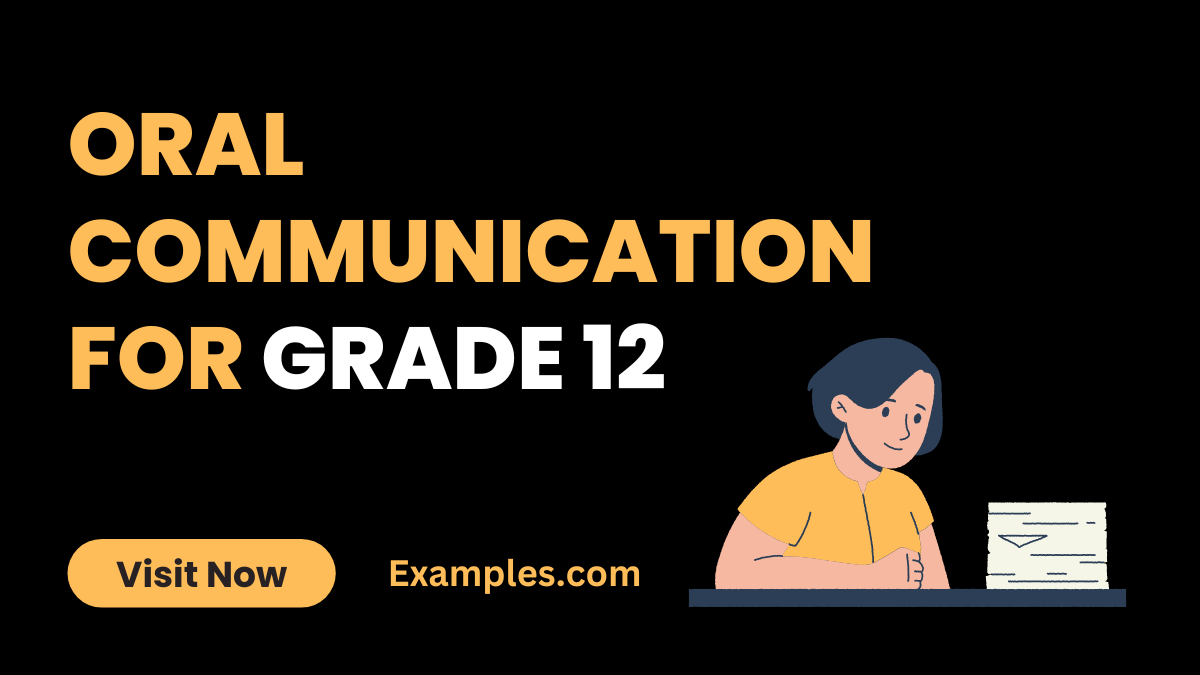Oral Communication for Grade 12
Oral communication skills are pivotal for Grade 12 students as they prepare for higher education and the professional world. This comprehensive guide delves into the nuances of effective verbal interactions, emphasizing the significance of mastering these skills. We’ll explore various oral communication examples, tailored specifically for Grade 12, to demonstrate how these techniques can be applied in real-life scenarios. Our focus will be on practical, engaging, and relatable examples, ensuring students grasp the essentials of articulate and impactful communication, essential for their academic and future career success.
20 Examples of Oral Communication for Grade 12
Oral communication in Grade 12 encompasses a broad range of scenarios, from academic discussions to social interactions. This segment provides 20 unique and distinct examples of oral communication, each accompanied by a concise explanation. These examples, ideal for Grade 12 students, illustrate various contexts and styles, enhancing students’ understanding and application of effective communication techniques. These real-life scenarios will equip students with the skills to articulate their thoughts clearly and confidently in different settings, a crucial ability for their academic and future professional endeavors.
- Presenting a Research Project: Explain your topic confidently, using clear language and engaging visuals to convey your message effectively.
- Debating on Environmental Policies: Articulate your viewpoint with well-researched facts, maintaining a respectful tone even when opinions differ.
- Leading a Group Discussion: Facilitate dialogue by asking open-ended questions and actively listening to others’ perspectives.
- Participating in a Literature Seminar: Share your interpretation of a text, backing your ideas with specific examples from the book.
- Delivering a Graduation Speech: Speak with a mix of emotion and sincerity, reflecting on shared experiences and future aspirations.
- Interviewing for a College Admission: Communicate your achievements and aspirations clearly, showing enthusiasm and confidence.
- Explaining a Scientific Concept: Use simple terms to describe complex ideas, ensuring clarity and understanding for all listeners.
- Negotiating in a Team Project: Find common ground through respectful conversation, focusing on solutions rather than conflicts.
- Performing in a School Play: Express emotions and character traits through your voice, enhancing the story’s impact.
- Giving Feedback in Peer Review: Offer constructive criticism with specific examples, coupled with positive reinforcement.
- Asking Questions in a Guest Lecture: Frame your queries clearly, showing engagement and interest in the topic.
- Participating in a Model United Nations: Argue your country’s position with clarity and diplomacy, while being open to others’ views.
- Conducting an Oral History Interview: Listen attentively and ask thoughtful follow-up questions to delve deeper into the narrative.
- Explaining a Math Problem Solution: Break down complex steps into simpler parts, ensuring comprehension by all classmates.
- Presenting a Business Plan in Entrepreneurship Class: Persuade your audience with a confident tone and well-structured arguments.
- Discussing a Current Event in Social Studies: Share your insights and connect the event to broader historical or cultural contexts.
- Persuading in a School Election Speech: Use compelling language to express your ideas and vision for the school community.
- Describing an Artwork in Art Class: Use descriptive language to convey the visual elements and emotional impact of the piece.
- Summarizing a Group Project in Science: Highlight key findings and teamwork experiences, showcasing collaboration and learning.
- Engaging in a Philosophical Debate: Present your arguments logically while respecting and addressing counterarguments thoughtfully.
Oral Communication for Grade 12 Worksheets
In Grade 12, oral communication is not just about speaking; it’s about effective interaction, persuasion, and presentation. Worksheets designed for this level focus on refining these skills through structured activities. Below is a table of worksheets tailored for Grade 12 students, each targeting specific aspects of oral communication. These worksheets are designed to be interactive and thought-provoking, encouraging students to analyze, practice, and enhance their communication skills in various contexts.

| Worksheet Title | Focus Area | Description |
|---|---|---|
| The Art of Persuasion | Persuasive Speaking | Explore techniques to effectively persuade an audience, focusing on ethos, pathos, and logos. |
| Debate Preparation | Argumentative Skills | Structured exercises to develop skills for debating, including research, forming arguments, and rebuttal strategies. |
| Public Speaking Practice | Presentation Skills | Activities to improve public speaking, focusing on voice modulation, pacing, and audience engagement. |
| Active Listening Skills | Listening and Feedback | Exercises to enhance listening skills and provide constructive feedback in conversations. |
| Interpersonal Communication | Social Interaction | Scenarios and role-plays to improve communication in one-on-one and group settings. |
| Non-Verbal Communication Cues | Body Language | Understanding and practicing the use of body language and facial expressions in communication. |
| Effective Questioning Techniques | Inquiry Skills | Developing skills to ask insightful and open-ended questions in discussions. |
| Narrative and Storytelling | Expressive Communication | Crafting and delivering engaging stories or personal experiences. |
| Conflict Resolution Strategies | Negotiation Skills | Techniques for resolving disagreements and maintaining positive communication. |
| Cultural Communication Awareness | Cross-Cultural Communication | Activities to understand and respect cultural differences in communication styles. |
Oral Communication Mastery for Grade 12 Students
Achieving mastery in oral communication is a key milestone for Grade 12 students. This section offers a curated list of 10 unique and best examples of oral communication, each tailored to the specific needs and contexts of senior high school students. These examples are designed to demonstrate effective communication strategies, helping students develop a nuanced understanding of various communication styles and techniques. Through these examples, students will learn how to effectively convey their ideas and emotions, engage with diverse audiences, and navigate complex communication scenarios with confidence and skill.
- Elevator Pitch for a School Project: Craft a concise and compelling pitch to explain your project’s core idea and its impact.
- Hosting a Podcast on a Relevant Topic: Create and host a podcast discussing a current issue, demonstrating clear articulation and engagement with the topic.
- Leading a Volunteer Group Meeting: Direct a meeting with clear objectives and inclusive participation, ensuring everyone’s voice is heard.
- Negotiating in a Mock Business Scenario: Role-play a business negotiation, focusing on persuasive communication and compromise.
- Presenting a Scientific Discovery: Explain a complex scientific concept in simple terms, using visuals and analogies for clarity.
- Delivering a Valedictorian Speech: Combine personal anecdotes with inspirational messages, speaking to both heart and mind.
- Participating in a Cultural Exchange Program: Share about your culture and learn about others, showcasing open-mindedness and curiosity.
- Organizing a Debate on Technology in Education: Moderate a balanced discussion, encouraging critical thinking and respectful disagreement.
- Explaining a Historical Event in a Creative Manner: Use storytelling techniques to narrate a historical event, making it engaging and informative.
- Conducting a Peer Teaching Session: Teach a concept to classmates, using clear explanations and interactive methods for effective learning.
Why is Oral Communication Important in Senior High School?

Oral communication is a cornerstone skill that holds immense significance in the senior high school environment. In this comprehensive guide, we’ll delve into the multifaceted importance of oral communication during the senior high school years. Understanding the value of this skill empowers students to actively develop and hone their oral communication abilities, setting the stage for academic and personal success.
1. Academic Success
Effective oral communication is indispensable in senior high school as it directly impacts academic performance. Students who can articulate their ideas clearly excel in classroom discussions, presentations, and debates, leading to higher grades and a deeper understanding of subjects.
2. Critical Thinking
Engaging in oral discourse fosters critical thinking skills. Students must learn to express their thoughts, defend their viewpoints, and respond to questions and challenges effectively. This skill not only aids academic growth but also prepares them for future challenges.
3. Confidence Building
Confidence is a byproduct of effective oral communication. High school students who can express themselves confidently gain self-assurance, which extends beyond the classroom into various aspects of their lives, including social interactions and future career endeavors.
4. Peer Collaboration
Collaborative projects and group activities are common in high school. Strong oral communication skills are essential for effective collaboration, allowing students to contribute to group discussions, present ideas coherently, and work together harmoniously.
5. Leadership Development
Senior high school is an ideal time for students to develop leadership skills, and oral communication is a fundamental component of leadership. Leaders must inspire and guide their peers, and effective communication is key to achieving this.
6. Preparation for College and Beyond
As students approach college applications and scholarship interviews, their ability to communicate clearly becomes crucial. Strong oral communication skills make a positive impression on college admission committees and potential employers.
7. Career Readiness
In the modern job market, effective communication is highly sought after by employers. High school students who develop strong oral communication skills gain a competitive edge in their future careers.
8. Personal Growth
Beyond academics and careers, effective oral communication contributes to personal growth. It enables students to express their ideas, emotions, and concerns, fostering healthier relationships with peers, teachers, and family members.
9. Empowerment
Oral communication empowers students to have a voice and advocate for their needs. It equips them with the tools to express themselves, seek help when necessary, and engage in meaningful conversations.
10. Lifelong Skill
Perhaps most importantly, the ability to communicate effectively is a lifelong skill. High school serves as the foundation for acquiring and honing this skill, setting the stage for success in college, careers, and personal life.
How to Develop Oral Communication Skills in Grade 12 Students?
Grade 12 marks a crucial phase in a student’s journey, and developing strong oral communication skills is essential for academic and personal growth. In this comprehensive guide, we’ll explore effective strategies and techniques to help Grade 12 students enhance their oral communication abilities. These practical tips and exercises are designed to empower students to become confident, articulate communicators, ready to excel in college, careers, and beyond.
1. Know Your Audience
Tailor your communication style to your audience. Whether you’re addressing classmates, teachers, or interviewers, understanding their backgrounds, interests, and expectations allows you to adapt your approach effectively.
2. Speak Confidently
Confidence is a key component of effective oral communication. Practice speaking in front of a mirror, record yourself, and gradually build your confidence by speaking in diverse settings, such as classroom presentations or extracurricular activities.
3. Master Your Body Language
Your body language speaks volumes. Maintain eye contact, use appropriate gestures, and stand or sit with good posture to convey confidence and engagement. Effective body language complements your words.
4. Be Concise
Avoid verbosity. Practice summarizing your ideas succinctly, focusing on clarity and brevity. This skill is invaluable when delivering presentations or engaging in discussions.
5. Seek Feedback
Actively seek constructive feedback from peers, teachers, or mentors. Analyze your communication for areas of improvement and work on them consistently. Constructive criticism is a powerful tool for growth.
6. Think Before You Speak
Before speaking, take a moment to organize your thoughts. This practice prevents stumbling and ensures you communicate your ideas effectively and coherently.
7. Enhance Clarity
Articulate your words clearly. Practice enunciation and pronunciation to enhance your clarity. Clear communication ensures your message is easily understood.
8. Mind Your Tone
Be mindful of your tone. Adjust it to match the context and convey your intended message accurately. Tone plays a crucial role in effective communication.
9. Avoid Clichés
Use original and relevant language to engage your audience. Avoiding clichés ensures your message is fresh and impactful. Unique expressions can capture your audience’s attention.
10. Prioritize Clarity
Above all, prioritize clarity. Ensure your message is easily understood, and be prepared to clarify any ambiguities if needed. Clear communication minimizes misunderstandings.



